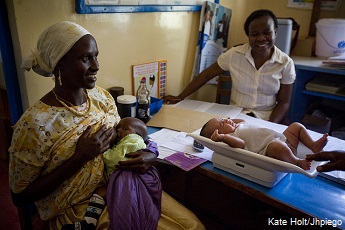Infant and Young Child Nutrition
MCSP continued work that begun under USAID’s predecessor Maternal and Child Health Integrated Program (MCHIP) through the development of innovative, culturally resonant infant and young child nutrition approaches, using formative assessments and implementation science research.
MCSP developed a nutrition brief and associated peer-reviewed article presenting a global review of key barriers to exclusive breastfeeding in the first six months of life. The Program also published a brief — entitled “Junk food consumption is a nutrition problem among infants and young children: Evidence and program considerations for low and middle income countries” — on how to address junk food consumption within the context of infant and young child feeding (IYCF) programming in low- and middle-income countries.
Key Country Results
At the country level, MCSP supported IYCF programming in several ways:
- In Kenya, MCSP in collaboration with the Ministry of Health and UNICEF led the development of the first-ever, national-level Baby-Friendly Community Initiative (BFCI) Implementation Guidelines and BFCI monitoring and evaluation tools and external assessment protocols. The Program rolled-out complementary feeding recipe books tailored for western Kenya in BFCI communities:
o Kenya Baby-Friendly Community Initiative Implementation Guidelines
o Kenya Baby-Friendly Community Initiative External Assessment Protocol
o Complementary Feeding Practices: Using Trials of Improved Practices to Improve Complementary Feeding in Migori and Kisumu, Kenya
o Recipes for Complementary Feeding Children 6 to 23 months of Age in Kisumu and Migori Counties
o A Counseling Guide for Complementary Feeding for Children 6-23 Months in Kisumu and Migori, Kenya
o Integrating Maternal, Infant, and Young Child Nutrition and Family Planning Services in Bondo Sub-County, Kenya - In Malawi, MCSP collaborated with the Ministry of Health to adapt the World Health Organization’s 20-hour Baby Friendly Hospital Initiative (BFHI) course to include the latest guidance around prevention of mother-to-child transmission of HIV. The Program supported the training of 54 hospitals in all 28 districts of Malawi and built the capacity of 1,940 hospital staff. This resulted in greater than 80,000 mothers receiving counseling on exclusive breastfeeding from August 2016-December 2017.
- In Mozambique, MCSP conducted a formative assessment on cultural beliefs, barriers and perceptions related to IYCF in Nampula province. The Program also developed a counseling guide and recipe book on IYCF.
- In Tanzania, the Program led a formative assessment to explore sociocultural and environmental cues to birth spacing and maternal and IYCN (MIYCN) practices and to identify barriers and facilitating factors for optimal family planning and MIYCN practices.
- In Pakistan, MCSP conducted a qualitative study to assess supply and demand for IFA supplementation and quality of IYCF counseling in Jamshoro and Thatta districts.
- In Haiti, the Program also conducted a qualitative assessment to identify barriers to exclusive breastfeeding.
- MCSP published an open access article on Program considerations for integration of nutrition and family planning: Beliefs around maternal diet and breastfeeding within the context of the nutrition transition in Egypt, which identified beliefs and cultural practices around breastfeeding and maternal diet and identified areas in which nutrition and family planning programming could be integrated.

